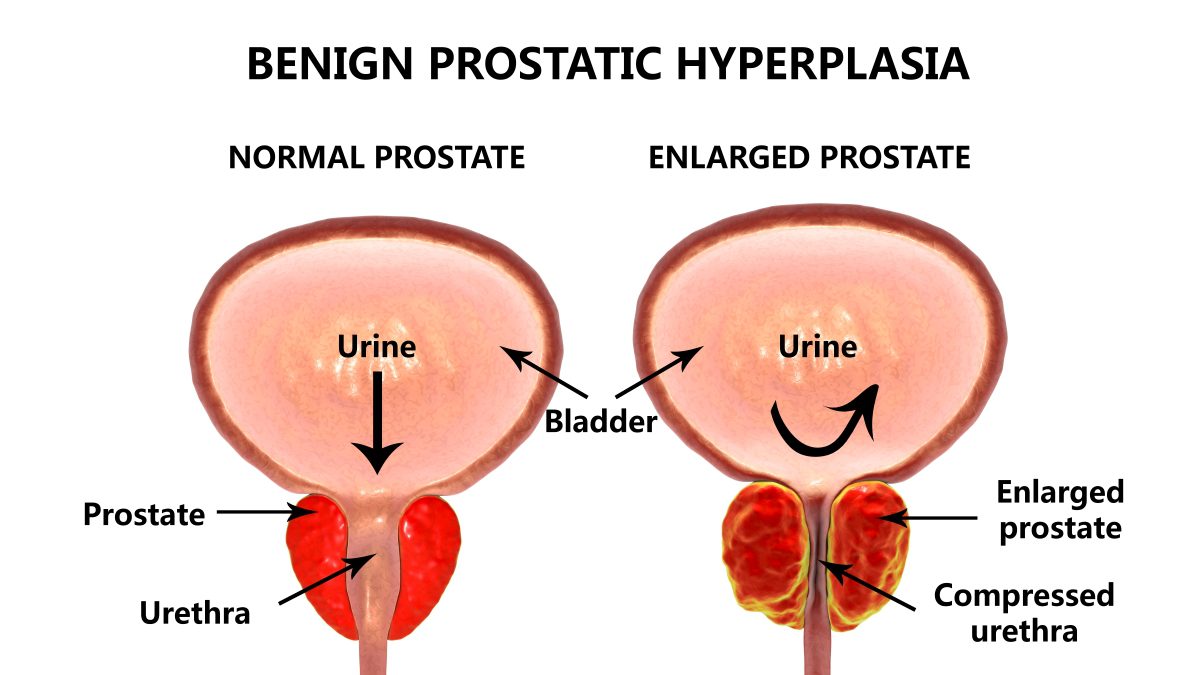A common problem that older men face is benign prostatic hyperplasia (BPH), or simply an enlargement of their prostate gland. Prostatic hyperplasia causes unpleasant urinary symptoms of different severity that progressively worsen as time passes.
BPH symptoms
Common BPH symptoms manifest by frequent need for urination at night (nocturia), frequent urination and urgent needs, difficulty emptying your bladder fully, and weak or intermittent urine flow. Also, it is difficult for the person to start urination, and at the end of the process, dribbling occurs. Among less common BPH symptoms are infections of the urinary tract, bloody urine, and inability to urinate. A men’s prostatic gland size doesn’t always correlate with their symptoms of prostatic hyperplasia. Thereby, a slight increase in the prostate gland size in some persons can cause more severe symptoms than much more enlarged prostate gland in others.
The symptoms listed above can be caused not only by benign prostatic hyperplasia but also by several other disorders. Such disorders include infection of the urinary tract, prostatitis (prostate inflammation), stones in the bladder or kidneys, scarring in the bladder neck, which can be a result of underwent surgery, abnormal function of nerves that control the bladder, or cancer of the bladder or prostate.
When do I need to see a doctor?
If you have any of the listed symptoms, you should see a doctor because it’s better to identify the primary cause of unpleasant symptoms in the early stages. An ignoring of early signs can lead to severe complications and even to urinary tract obstruction.
What can cause benign prostatic hyperplasia?
To understand the reasons for the development of prostatic hyperplasia, firstly, it’s better to familiarize yourself with the physiology of the prostate gland. The prostate gland is located under the urinary bladder. The urethra is a tube responsible for transporting urine from the urinary bladder out of the penis. The urethra passes through the prostate gland, inhibiting the normal urine flow when the prostate gets larger.
Commonly men have a steady growth of the prostate gland throughout their lives. Unfortunately, continual growth enlarges the prostate enough to develop uncomfortable symptoms of urinary disorders or partially block urine flow. One of the main reasons for continual enlargement of the prostate gland can be the balance of sex hormones that change throughout a man’s life.
Risk factors of the development of Benign Prostate Hyperplasia
The common risk factors for prostate enlargement include:
- Lifestyle. Obesity and a sedentary lifestyle increase the risk of development of BPH, while an active lifestyle and exercise can reduce this risk.
- Family history. If someone of your blood relatives (such as brother or father) has problems with the prostate, you’re at high risk of the issues with prostate glans.
- Aging. Age is one of the main risk factors for BPH symptoms. The enlargement of the prostate gland is not common among men younger than 40 years. According to statistics, about one-third of men above age 60 are experiencing unpleasant symptoms of moderate or severe level. In addition, nearly half of men have such symptoms by the age of 80.
- Heart diseases and diabetes. Based on the studies, heart diseases, diabetes, and the use of beta-blockers might increase the risk of benign prostate hyperplasia.
What complications can the enlarged prostate gland cause?
- Urinary tract infections. One of the symptoms of BPH is the inability to empty the urine bladder completely. It can increase the risk of urinary tract infections development. Furthermore, if you have frequent urinary tract infections, there is a possibility that you might need the surgical removal of the part of the prostate.
- Kidney damage. Urinary detention causes pressure in the bladder that can damage the kidneys and distribute the bladder infections to the kidneys.
- Bladder damage. The inability to fully empty the bladder can lead to its stretching and weakness within time. Consequently, the muscular wall of the urinary bladder loses its property to contract normally. As a result, it makes the complete depletion of the urinary bladder much harder.
- Bladder stones. As a result of the inability to empty the bladder entirely caused by BPH, bladder stones can appear. Bladder stones can lead to bladder irritation or infection, bloody urine and urine flow obstruction.
- Urinary retention. Urinary retention is an inability to urinate. In this case, the person has a catheter inserted into the urinary bladder to empty it. In some cases, men need surgery to deal with urinary retention.
Although most men do not suffer from such severe complications, the possibility always exists. Therefore, if you notice any of the symptoms of benign prostatic hyperplasia, you should consult a doctor as soon as possible to determine an appropriate course of treatment for benign prostatic hyperplasia.
Click Here to read about Treatment.
















Leave a Reply
You must be logged in to post a comment.